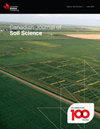Biochar–compost mixture and cover crop effects on soil carbon and nitrogen dynamics, yield, and fruit quality in an irrigated vineyard
IF 1.5
4区 农林科学
Q4 SOIL SCIENCE
引用次数: 1
Abstract
Abstract Effects of biochar–compost (B+Com) mixture and cover crop were assessed on soil and grapevine productivity in an irrigated Merlot (Vitis vinifera L.) vineyard in Okanagan Valley, British Columbia (BC), Canada, from 2017 to 2020. The experimental design was a factorial arrangement of control, B+Com, cover crop, and combination of cover crop and B+Com (cover crop/B+Com) treatments in alleys with four replications. The B+Com comprised a 1:1 ratio of biochar and compost and was applied at a rate of 22 Mg ha−1 dry weight basis in May 2017 and 2019. The cover crop consisted of a dryland forage mixture and bird’s-foot trefoil (Lotus corniculatus L.). B+Com treatment did not affect cover crop biomass or tissue C and N concentrations except for a 12% reduction in 2019 biomass. B+Com and cover crop/B+Com increased soil C content averaged across sampling dates by 11% and 17% (P < 0.05), respectively, only at the 0–15 cm soil depth compared with the control. Cover crop treatment did not affect (P < 0.05) soil C content at two soil depths in all sampling dates. Soil N content was not affected by B+Com, decreased by an average of 12.5% at both soil depths with cover crop, and increased with cover crop/B+Com by 4% only at the 0–15 cm soil depth averaged across sampling dates (P < 0.05). Grape yield was increased by 32% by cover crop/B+Com relative to control only in 2020. The cover crop reduced petiole N and pruning weights in one or two years out of three.生物炭-堆肥混合物和覆盖作物对灌溉葡萄园土壤碳氮动态、产量和果实质量的影响
2017 - 2020年,在加拿大不列颠哥伦比亚省奥肯那根谷的一个梅洛灌溉葡萄园,研究了生物炭-堆肥(B+Com)混合物和覆盖作物对土壤和葡萄产量的影响。试验设计为对照、B+Com、覆盖作物、覆盖作物与B+Com(覆盖作物/B+Com)组合处理,共4个重复。B+Com由1:1比例的生物炭和堆肥组成,在2017年5月和2019年5月以22 Mg ha−1干重为基础施用。覆盖作物由旱地牧草和鸟脚三叶草(莲花)组成。B+Com处理不影响覆盖作物生物量或组织C和N浓度,但使2019年生物量降低了12%。B+Com和覆盖作物/B+Com仅在0 ~ 15 cm土壤深度较对照提高了11%和17%的土壤碳含量(P < 0.05)。覆盖作物处理对两个土层深度的土壤C含量均无显著影响(P < 0.05)。土壤氮含量不受B+Com的影响,在覆盖作物覆盖的土壤深度和覆盖作物/B+Com覆盖的土壤深度均平均下降12.5%,仅在0 ~ 15 cm土壤深度平均增加4% (P < 0.05)。与对照相比,覆盖作物/B+Com在2020年增加了32%的葡萄产量。覆盖作物在三年中的一年或两年减少叶柄氮和修剪重量。
本文章由计算机程序翻译,如有差异,请以英文原文为准。
求助全文
约1分钟内获得全文
求助全文
来源期刊

Canadian Journal of Soil Science
农林科学-土壤科学
CiteScore
2.90
自引率
11.80%
发文量
73
审稿时长
6.0 months
期刊介绍:
The Canadian Journal of Soil Science is an international peer-reviewed journal published in cooperation with the Canadian Society of Soil Science. The journal publishes original research on the use, management, structure and development of soils and draws from the disciplines of soil science, agrometeorology, ecology, agricultural engineering, environmental science, hydrology, forestry, geology, geography and climatology. Research is published in a number of topic sections including: agrometeorology; ecology, biological processes and plant interactions; composition and chemical processes; physical processes and interfaces; genesis, landscape processes and relationships; contamination and environmental stewardship; and management for agricultural, forestry and urban uses.
 求助内容:
求助内容: 应助结果提醒方式:
应助结果提醒方式:


